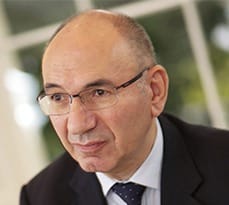
The current slump in world stock markets is substantial, though not as severe as past crashes related to oil, credit and tech over recent decades. But it’s too early to draw long-term conclusions, says Professor Elroy Dimson of Cambridge Judge Business School.
Asked by host Robin Powell of The Evidence Based Investor blog whether recent stock market swings have been more volatile than in previous downturns, Elroy, Chairman of the Centre for Asset Management at Cambridge Judge, said the answer is “unfortunately sort of yes and no”.
“At one level markets respond faster and faster to pieces of news because news travels very quickly,” he told the blog’s podcast, posted on 31 March.
“But on the other hand, if we ask ourselves what we really care about in terms of downsides in the market. It’s not vibration from one day or one week to the next – it’s what might happen if you go through a protracted down period” such as the credit crash of 2007, tech crash in 2001 after the dotcom boom, or oil shock of the 1970s. Over those volatile periods, world stock markets fell by about a half in real terms, and some countries fared even worse than the global average, Elroy said.
In the just-ended first quarter of 2020, the Dow Jones Industrial Average in the United States fell 23%, the broader S&P 500 index fell 20%, and the FTSE 100 in Britain declined by 25%.
“So have we seen the worst? No, we haven’t had a 50% fall for most people who are invested in world stock markets. We don’t know whether we’re at the end of a crash; so we may be just in the middle of a journey, or we may be confronting buying opportunities. We may be in the end of a crash and there’s going to be a recovery. We won’t know that for a while,” Elroy said.
Elroy followed up the podcast a few days later with a video webinar with host Robin Powell. Elroy noted that unlike some one-time events such as the stock market crash of October 1987, the coronavirus crisis “is not a disruption of a transient nature, it’s much worse than that.”
Answering questions from Australia, New Zealand and elsewhere, he emphasised the unpredictability of the current stock market situation and the fact that history doesn’t always provide firm guidance. “If you were to ask is the year going to end up, sideways or down, our best guess is down. But quite what the magnitude is, we don’t know. What historians often remind us about is that history doesn’t repeat itself, but it rhymes.”
In the podcast, Elroy was reminded of a book he co-authored in 2002, Triumph of the Optimists: 101 Years of Global Investment Returns, which includes this passage:
“As we have seen in the early years of the 21st Century, investment in equities will remain risky. This is because business itself is risky, and because the years ahead will bring new forms of disorder and volatility. Instead of – or perhaps in addition to – the disruptions of the past, the new century may herald new international terrorism, new diseases, threats of large-scale litigation and corporate liability, environmental disasters, and new pestilences as yet beyond our expectation.”
“So viruses and plagues were on our minds when this century began,” Elroy noted.
An article covering this podcast has been published by Global Systematic Investors.


